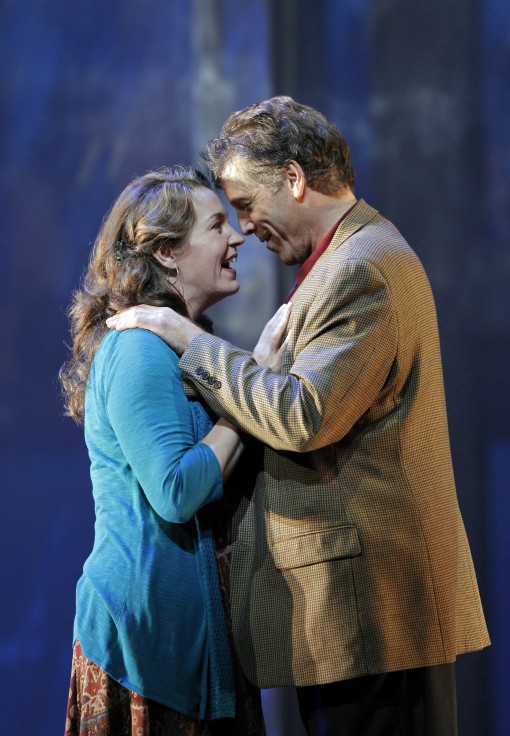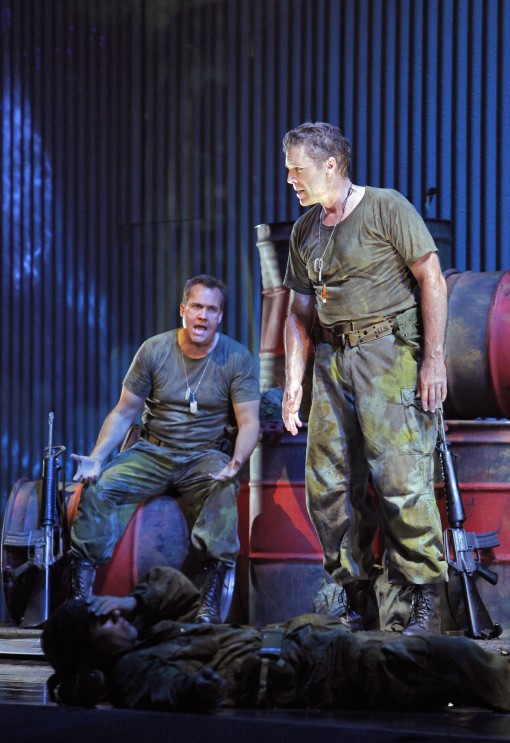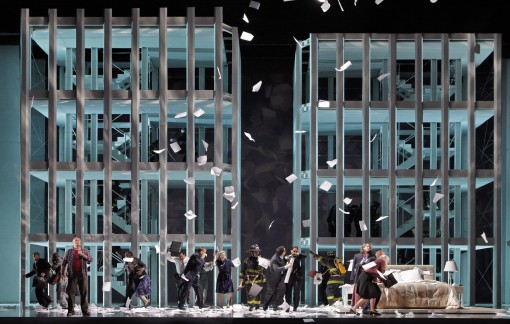“Heart of a Soldier” a flawed yet moving and powerful portrait of one 9/11 hero

Thomas Hampson and Melody Moore as Rick Rescorla and Susan Rescorla in Christopher Theofanidis' opera "Heart of a Soldier," which premiered at San Francisco Opera Saturday night. Photo: Cory Weaver
Near the end of Heart of a Soldier, Christopher Theofanidis’ new opera, the 2001 terrorist attack on the World Trade Center is recreated as the protagonist Rick Rescorla, his wife Susan, and Rick’s best friend Dan Hill desperately call one another on their cell phones. At the moment of collapse, the now-iconic sheets of paper rain down, the towers glow red and then an ashen gray as Rescorla, chief of security for Morgan Stanley, dies in the collapse of the South Tower. After ten years, seeing this horrific moment recreated on stage, even abstractly, is bone-chilling and still makes one queasy.
San Francisco Opera presented the world premiere of Heart of a Soldier Saturday night on the weekend of the tenth anniversary of the terrorist attack on the World Trade Center. This highly anticipated new work, starring Thomas Hampson as Rescorla, was commissioned by San Francisco Opera and directed by Francesca Zambello, who, along with general director David Gockley, was the driving force behind this project.
Inevitably, no work of art can hope to convey the scale or tragic dimensions of that day’s events. For many, the loss of thousands of human lives, the toll on the victims’ families and loved ones, and the seismic, continuing international political fallout can still seem too unsettled, complex, and devastating to come to terms with even after a decade.
Heart of a Soldier doesn’t try to address the terrorist attacks on a political level or from a broader perspective, and, despite its provenance and the timing of the premiere, it’s not a “9/11 opera.” Rather it’s a straightforward narrative concentrating on the story of a unique man who was one of that day’s many heroes.
Closely based upon the book of the same name by James B. Stewart, the opera tells the story of Rick Rescorla, the security chief of Morgan Stanley, whose prior preparation, evacuation drills and actions the day of the attacks helped save the lives of nearly all of the company’s 2,700 employees. Ignoring the Port Authority P.A. announcements telling workers to stay at their desks, Rescorla directed them down the stairs of the South Tower to safety. Going back in to look for remaining workers, Rescorla perished in the tower’s collapse.
Rather than jumping between the separate narratives of the trio of protagonists as structured in Stewart’s book, the opera focuses largely on Rescorla’s extraordinarily full life. The first act spans nearly thirty years, beginning with Rick’s wartime boyhood in Cornwall where friendly American G.I.’s made a lasting impression on young Cyril (Richard was his middle name, later adopted as his first). We follow his career as a soldier in Rhodesia where he meets the American military intelligence operative Daniel Hill, who would become his lifelong friend and comrade in arms. The two men join the U.S. army and serve with distinction in Vietnam, where Rescorla launches an unauthorized mission to save Hill’s life. The friends return to the U.S. where Rescorla marries and Dan surprises his friend by converting to Islam.
The forty-minute second act concentrates almost entirely on Rescorla’s late middle-age romance with Susan Greer, who he meets as he is out jogging and she is walking her dog, Buddy. Both are divorced, and the two form an intense and instantaneous romantic attachment and become married.
Now employed as the security chief for Morgan Stanley at the World Trade Center, Rick is frustrated by the company and the Port Authority ignoring his repeated warnings about the probability of a second terrorist attack after the failed 1993 bombing. The power-suited Stanley financial workers treat Rescorla’s drills with annoyed bemusement, yet that preparation helped to save their lives. Using a bullhorn, Rescorla sang, cajoled and ordered the employees down the stairs and out of the building, forsaking his own personal safety in light of his duty, which would cost him his life.
That’s a lot to pack into a fairly short evening. The good news is that in his first opera, Theofanidis shows impressive facility and comfort in the form. As with his orchestral works, his music is unapologetically tonal and melodic, spiced with astringency where appropriate and smartly scored. There are rhythmic martial military choruses, a plaintive folk-like Cornish theme, some aggressively thunderous music (with ordinance sound effects) for the Vietnam battle scenes and two massive fortissimo blasts when the towers are hit. Also striking are the eerie, exotic percussion writing for the Vietnam scenes and the haunting Middle-Eastern muezzin call to prayer painting Hill’s conversion to Islam.

William Burden as Dan Hill and Thomas Hampson as Rick Rescorla. Photo: Cory Weaver.
As Zambello has said, the opera is really a “dual love story,” reflecting the passionate romance of Rick and Susan but also the close bond and code of honor that unite Rick and Dan.
Theofanidis’ lyrical style is well-suited to what is in essence, a personal tale, and it is those intimate moments that come off most successfully: the yearning recurring motto theme of farewell, the duets of friendship for the two men and the romance of Rick and Susan depicted in a charming first date and romantic scene. The noble soaring brass theme that opens the opera returns at the end as the aria, I’ll be there with you, as Rick bids farewell in an aria that links his friendship with Dan and his final act of duty, to the great battles of the past. (Rescorla was a lifelong Kipling fan and scholar of military history.) The final scene is a theatrical master stroke: as Dan and Susan wash their hands in the dust of the fallen towers in a (deftly foreshadowed) symbolic act of catharsis, the opera ends not with the orchestra but the plaintive sound of distant bagpipes, a moment evocative of Rescorla’s Cornish origins, but also the same instrument heard at so many funerals for the fallen in New York City and elsewhere.
Yet even at a tight two acts and 130 minutes, the opera, perhaps inevitably, falls short as a cohesive whole. The first act in particular seems breathless and dramatically unfocused, packing in too much. We jump from Rescorla’s childhood in Cornwall to meeting Hill in Rhodesia, boisterous drinking, army training at Fort Benning, searing Vietnam battles, their return to the U.S., Rick’s first marriage and Hill’s conversion to Islam. One can understand the opera’s creators wanting to fit in all the key facets of Rescorla’s amazing life, but the first act too often feels like a sequence of cinematic scenes rushing past with obbligato musical accompaniment. The final scene with the wedding reception of Rick’s first marriage in particular feels dramatically irrelevant to the arc of the piece and seems to exist only to end Act 1 with a large ensemble and contrast the dancing and drunken revelry with Hills’ conversion to ascetic Islam. There is room for some artful revision that might make for a more concentrated and less hectic first act.
Zambello moves the action briskly, wisely avoiding any extraneous political flourishes and letting the facts of these people’s rich lives speak for themselves. As in her Ring production in San Francisco this past summer, the skillful use of projections and video—including a snippet of Lyndon B. Johnson’s Gulf of Tonkin speech—is especially effective.
Donna Di Novelli had a daunting task, having to write a libretto depicting military training and Vietnam battles. The rough American vernacular—with more profanity than one usually hears on the opera stage—- has a literal quality that too often verges on pedestrian but the libretto reaches a more elevated, poetic expression in Act 2 — the corny Cole Porter Lite couplets for Rick and Susan’s first date apart.
With much visual projection — imaginatively rendered by S. Katy Tucker — the actual sets are minimal but the evocation of the World Trade Center by Peter J. Davison is a genuine stunner: two four-level transparent towers, brightly lit against a blue background reflecting the cloudless skies of that clear cool autumn day a decade ago.
Thomas Hampson gives one of the performances of his long and successful career as Rescorla. There is a certain tonal dryness to the baritone’s upper range these days but no loss of power, intensity or sensitivity. Hampson conveys the full and often contradictory range of Rescorla as profane soldier, heroic commander and macho guy who also has a deep and tender abiding love for Susan.
As Dan Hill, William Burden makes a theatrical entrance singing his first aria while literally parachuting in to the action from the top of the War Memorial Opera House proscenium. Burden’s vibrant tenor made a fine contrast to Hampson’s dark baritone and the two men threw themselves into their roles, literally so with the Act 1 wrestling scene.
Melody Moore was equally inspired as Susan Rescorla, making this middle-aged romance both touching charming, and almost unbearably poignant in light of the abrupt tragic end that we know is coming. (The audience loved Koa, the well-rehearsed golden retriever who played her dog, Buddy.)
Nadine Sierra, a company Adler Fellow, made a most auspicious company debut as Juliet, the girlfriend of the medic Tom, a close Rescorla friend who is killed in action. The device of her (and other wives and girlfriends) reading letters and Juliet’s repeated ghostlike appearances in the battle scenes proved less effective upon repetition, but lent the right dramatic and musical contrast to the Vietnam sequence. Singing with rich tone and sensitivity, Sierra seems to have all the qualities for a major career.
As Tom, Michael Sumuel sang with passion and point backed by the other members of Rescorla’s platoon (Ta’u Pupu’a, Daniel Snyder and Wayne Tigges). Mohannad Mchallah lent idiomatic expression to the Imam’s call to prayer and Henry Mason Phipps provided the right boyish, piping tones for young Rick. The rest of the large cast and the San Francisco Opera Chorus filled out the supporting roles with distinction.
Patrick Summers, our leading conductor for launching new American operas, directed the score with consummate care and laser-like focus, bringing out the violent cataclysms of the Vietnam sequences as surely as the tenderness of the love scenes. The San Francisco Opera Orchestra responded with comparable power, tonal gleam and sensitivity.
Even with its faults, Heart of a Soldier is a noble, moving and ultimately transcendent work, and much credit must be given to the creative team and cast for pulling off a project fraught with potential landmines. It’s a fine tribute to a remarkable man, as well as Dan Hill and Susan Rescorla, both of whom were in attendance at Saturday’s premiere.
Heart of a Soldier runs through Sept. 30 sfopera.com; 415-864-3330

Photo: Cory Weaver